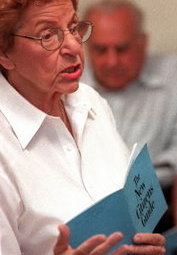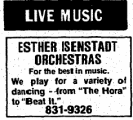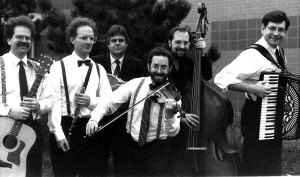Posts from — November 2010
CINEMA TOPOGRAPHY
Nowhere Boy, the movie about John Lennon as a teenager, wasn’t that great. But the setting was.
The movie was very soap opera–ish. Lennon and his mother seemed to be having an affair on screen.
My wife, Alice, wanted to see Nowhere Boy. Or any movie. We had a friend visiting from out of town. The friend chose Nowhere Boy too. Alice said the movie had 81 percent on Rotten Tomatoes.
Eighty-one percent is horrible! But I went, to be a sport.
Nowhere Boy is a drama set in 1950s Liverpool: double-decker buses, Morgans and Teddy Boys. Yes!
Oh, to be in England . . .
[Please click video to continue:]
November 26, 2010 No Comments
THANKSGIVING WEDDING . . . SICK
When the mother of the bride says you’re on for the wedding, you’re not always on. The bride, not the mother, makes all final decisions. The bride can — and will — override Mom.
I once negotiated a Thanksgiving Day wedding. The mom thought Thanksgiving would be the perfect wedding day, because nobody would come. The groom’s side was from New York, so flights to Cleveland would be expensive. Terrific. And the locals would pass on the wedding to eat Thanksgiving dinner at home with their kids, who wouldn’t be invited to the wedding. Also, terrific.
I listened to this for three phone calls.
Then the mom hired Yiddishe Cup.
Yes!
The band members rescheduled their own Thanksgiving dinners. Not an easy task.
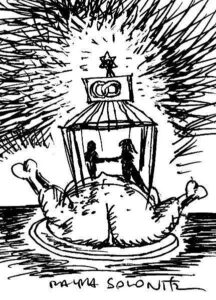 The mom called a fourth time and said the bride wanted a different band. I didn’t even ask who. I usually ask, but I was so mad — mostly at myself because I had forgotten the rule “it’s all about the bride.”
The mom called a fourth time and said the bride wanted a different band. I didn’t even ask who. I usually ask, but I was so mad — mostly at myself because I had forgotten the rule “it’s all about the bride.”
[Exception: A mom booked us for a Cleveland wedding, and the bride — from Seattle — ran up to the bandstand and said, “I hate klezmer music! How could my mother do this to me!”]
After Ms. Thanksgiving Turkey hung up, I called a second client — a bat mitzvah mom — who was late with her contract and deposit.
She said she wanted to talk more. I had already talked to her several times. I said, “Yiddishe Cup has been around over twenty years. You’ve seen us. Everybody has seen us. You know what we’re all about.”
She said her husband was sick.
Pause. Sick in the band biz means very ill. It sometimes means dying. I’ve played simchas (celebrations) for sick people; these affairs are the most poignant. I’ve seen dads roll down the aisle in wheelchairs. Dads who couldn’t talk because of strokes. Guys with half a brain left.
Yiddishe Cup has played for dead people; we played a bat mitzvah luncheon where the bat mitzvah girl’s mom died the day before. The funeral was the next day. We played in the family room instead of at the party center. Two or three people tried a hora.
The woman with the sick husband came to my house to further discuss the bat mitzvah. I asked what her husband’s illness was. She said he was depressed. Her husband — a doctor — had lost a patient that week.
He wasn’t sick! Doctors lose patients all the time! She just wanted to change the date, the number of musicians, and a few other things. Which she did.
The gig — on a new date, with fewer musicians — was surprisingly fun. Everybody was upbeat, and nobody bugged the band, except the good-natured grandfather, who said to our pianist, “Do you know your fly is down.”
Our pianist, not missing a beat, answered, “No, can you hum a few bars?”
Nobody was sick. That was something to be thankful for.
—-
Please see the post below too. It’s fresh.
—
Yiddishe Cup plays Columbus, Ohio, 6 p.m. Sun., Dec. 5. Chanukah. Please contact Tifereth Israel Congregation for details.
—
Illustration by Ralph Solonitz.
November 24, 2010 6 Comments
THE ESTHER ISENSTADT ORCHESTRAS
Bass player Esther Isenstadt ran classified ads in the back of the Cleveland Jewish News in the 1970s and 1980s: “Sophisticated music for discriminating people” . . . “Leave your records at home and bring LIFE to your party” . . . “From ‘The Hora’ to ‘Beat It.'”
Esther was gigging regularly when Yiddishe Cup started in 1988. I didn’t run into her. She was working the senior-adult circuit, while Yiddishe Cup was doing the glam jobs: bar mitzvahs and weddings. Esther was not a klezmer musician. She played mostly classical and pop — and some Jewish.
When I eventually met Esther, she was in The Weils assisted living facility. She was 86 (2003). She approached me after a Yiddishe Cup senior-adult program to say hello. I told her I knew of her. She smiled. I had one of her songbooks; I said I bought it used at the Cleveland Music School Settlement. She smiled again. Then she didn’t smile. She said, “I never thought I’d end up here!”
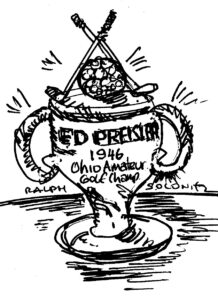 Ed Preisler — another Weils resident — chimed in, “I came out here to die.” (Ed died six months later.) Ed was the 1946 Ohio Amateur Golf Champion.
Ed Preisler — another Weils resident — chimed in, “I came out here to die.” (Ed died six months later.) Ed was the 1946 Ohio Amateur Golf Champion.
Ted Bonda, the former owner of the Cleveland Indians, was also there. I switched gears; I asked Ted, Ed and Esther — and the other people schmoozing after the program — if they knew Mickey Katz. One resident knew Mickey from Yale Avenue, Cleveland; another, from Berkshire Road, Cleveland Heights.
I asked the group if they were familiar with the word kile (hernia). Nobody knew it. That was surprising. Kile is the punch line in Mickey Katz’s song “16 Tons [of Hard Salami]” . . . “The balebus (boss) promised me a real gedile (glory), instead of geldile I catched me a kile (hernia).” The Weils was apparently not heavy-duty Yiddishists.
Esther Isendstadt had played in four suburban orchestras, raised a family, taught elementary school, led party bands and taught ESL in “retirement.” She was a Glenville High graduate, as were Bonda and Preisler. Glenville High was where Jewish overachievers went to high school in the 1930s. [John Adams High students — like my parents — would have disagreed with that. John Adams, in the Kinsman neighborhood, was more proste (working-class) than Glenville, but equally proud.]
I learned “Shir Lashalom” (A Song of Peace) from Esther’s book. That tune was a must-play in 1995 — the year Yitzhak Rabin was assassinated. The lyrics were in Rabin’s pocket when he got shot.
Esther had rubber-stamped Esther Isenstadt Orchestras on every other page of the used song book. A Jewish bandleader with a rubber stamp.
I got a rubber stamp.
Esther died last month at 93.
There weren’t many bands with names like the Esther Isenstadt Orchestra in the 1970s. There still aren’t.
—-
Illustration by Ralph Solonitz.
November 19, 2010 5 Comments
SHE STOLE MY SKIRT!
The tenant — a poet — said she liked the way the sunlight glinted through her living room blinds onto the hardwood floor.
“But what really got me,” she said, “was your company’s Craigslist ad about ‘a closet big enough to park a Mini Cooper in.'”
I liked her. She liked my copy writing. She thanked me for “two wonderful years.”
Another tenant — a waitress — interrupted the landlord-poet lovefest. The waitress, standing at the poet’s door, said another tenant — a third person — had just stolen the waitress’ skirt from the laundry room dryer and was wearing it.
“Wearing it in the building?” I said.
“Yes.”
The skirt was a full-length, tie-dyed orange, green and red hippie shmate. The skirt’s owner — the waitress — was 26.
The thief was a middle-aged black woman who wouldn’t answer her door. Not even when the cops showed up.
Meanwhile, I was also dealing with a drunk who had run her faucet all night, on purpose, and had called my manager a “pig.”
That woman got an eviction notice right then.
I decided to phone the black woman about the tie-dyed skirt. I got her boyfriend. Good. He was on the lease; she wasn’t. I told him the skirt thief had to be out in three days.
“Don’t put me out! She’ll go,” he said. He was a solid tenant, other than he left cigarette butts all over. He was 69 and “country” — from Tennessee. On his rent checks he wrote rant instead of rent in the memo line. (Another poet?)
“She can’t stay more than three days,” I said.
“Can I ask, sir, why is that?'”
“I rented to you, not her. The woman is not on the lease.”
I didn’t bring up the stolen skirt matter; that would have complicated things. But I wanted to say: “The next time your lady friend steals clothes from the laundry room, tell her not to wear the skirt in the building!” Out in three days.
My poet tenant enclosed a poem with her final rent payment. It began:
The way the forecast told of dark clouds,
drizzle, seemed more true than the way
the sun lit hills of trees, dull golds, rusts.
[by Karen Schubert]
I read that poem about 10 times. I concluded it was a “winter is a-comin in” poem. The drunks and skirt thieves were a comin’ in for the winter.
—-
Reminder: This blog is updated twice a week: Wednesday and Friday mornings. Please see the post below too. It’s kind of fresh.
November 17, 2010 No Comments
Y TU VIOLIN TAMBIÉN
From klezmer violinist Steven Greenman‘s “lawyer”:
Postscript: Galitzianers, please note, Greenman’s class begins Thursday (Nov. 18) in Santiago de Compostela, Spain.
***
Vid-loathers, here’s pretty much the same thing as the video, in text:
Klezmer violinist Steve Greenman asked my help in translating a Spanish contract. He thought he had a gig in Spain but wasn’t sure.
The contract wasn’t in Spanish. It was in Catalan, I guessed. Terceiro for tercero, for example.
We looked at an atlas. Verdict: Steve was going to Santiago de Compostela in northwest Spain, where he would teach master violin classes. The Spaniards probably had some local language up there. [Yes. Galician/Gallego.]
I said to Steve, “I saw a movie about a guy in a wheelchair filmed there. Can’t remember the name. It’s exotic. It’s nowheresville.” [The Sea Inside, 2007.]
Just another day for Greenman, who expects to get gigs in faraway places. He thinks the world will come to him because he has never made a mistake on violin. A klezmer gig in northwest Spain . . .
I was glad to be a part of it, even if my role was just to say “I have no idea what this contract says.”
November 12, 2010 2 Comments
SHOULD I RENT TO A STRIPPER?
(THE MOVIE)
This is the most acclaimed animation yet from the guys over at Challah-Barbaric. This movie may appear like a navel-gazing indulgence, but it’s not. It’s magical.
Should I rent to a Stripper? is the lost collaboration between Fred Flintstone and Maimonides. It is a guide for the perplexed landlord and tenant.
The two main characters — a sleazy guy from Yiddishe Cup LLC and a bug-eyed naïf — turn the nasty, grim, cutthroat real estate world into something even grimmer — and very robotic.
The landlord is so pompous at first. Then he’s more so. But the young lady draws forth a bit of the landlord’s humanity and even a Chanukah song lyric.
After the movie, the couple goes for drinks and has an affair.
2:57 minutes. United States, 2010
—-
[The first paragraph in the capsule movie review (above) is lifted, in part, from John Ewing’s Cleveland Cinematheque calendar.]
—-
This blog is updated every Wednesday and Friday morning. Please check out the post below. It is recently hatched.
November 10, 2010 7 Comments
DOWN AND OUT IN TROY, MICHIGAN
I was down and out in a Marriott hotel in Troy, Mich. The bride, several hours earlier, had told me, “I can’t dance in these shoes. Can I just watch the hora?”
She watched. I asked her three times if she wanted to be lifted on the chair. No, she said three times. The bride and groom stood in the middle of the hora circle like statuettes on a wedding cake.
There was no place to walk at the Marriott, which was in a large shopping development.
I wrote notes to myself on the hotel stationery to justify my existence. My truest observation: “Yiddishe Cup is providing a valuable service for the Jewish communities of the Midwest.”
The Marriott room had 8 pillows, 10 towels, 2 beds and 2 bathroom mirrors that showed everything.
I couldn’t justify 8 pillows, 10 towels, etc. I just couldn’t. That bride should have danced.
Luckily the hotel windows didn’t open.
—-
Yiddishe Cup plays this Sunday (Nov. 7, 4 p.m.) at the Brecksville United Church of Christ, Brecksville, Ohio. www.brecksvilleucc.org
—-
REMINDER: This blog now updates twice a week: Wednesday and Friday.
November 5, 2010 1 Comment
THE MIDWEST’S TOP 10 KLEZMER
. . . TOWNS
My nephew visits Big League baseball stadiums around the country as a hobby.
I visit Big League klezmer towns in the Midwest as a hobby. My remarks (below) are challah-to-challah comparisons. I’m not comparing Milwaukee to Paris.
The best Midwest klezmer towns:
1. Pittsburgh . . . Squirrel Hill, Shadyside. Everything you need. (Pittsburgh is not in the Midwest, but so what. It is west of the Alleghenies.)

Hebrew clock. Pittsburgh JCC
2. Chicago. The Midwest klez capital. Maxwell Street Klezmer Band is the band in the Midwest. A Cleveland boy — a Northwestern student — worked in the Maxwell Street office; I had that kid wired. Yes, a klez band with office help. Chi is that big. Powerful klezmer forces prevail in Chi. Max Street does not allow Ohio bands within 80 miles of The Loop. Yiddishe Cup played Rockford, Ill., once.
3. Detroit. West Bloomfield, a Motown suburb, has Temple Israel, a very attractive modern temple. There is such a thing. At concerts, the Temple Israel ark is curtained off by a striking yarmulke mandala.
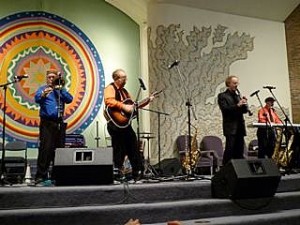
Yiddishe Cup at Temple Israel, 2010
4. Kansas City — as marvelously tough as Cleveland. KC’s Country Club Plaza is like Shaker Square but bigger and older.
5. St. Louis. Yiddishe Cup played there twice, then it all died out — the gigs. My Cleveland rabbi, who is from St. Louis, has a couple seats from the old Busch stadium. He should install the seats on our shul’s bima (altar) and invite Enos Slaughter to give the d’var torah (torah lesson/sermon). Good custard — Ted Drewes — in St. Louis. Similar to Cleveland’s East Coast Original Frozen Custard.
6. Milwaukee. Its claim to fame: songwriter Sigmund Snopek III, who wrote “Thank God This isn’t Cleveland.”
7. Minneapolis. There are a lot of klez bands up there: Prairie Heym Klezmorim, Klezmerica, etc. Too much klez in Minnie. Yiddishe Cup will never play there.
8. Cincinnati. The Plum Street Temple, where Stephen Wise officiated, is the most rakish and Moorish synagogue in the country. Check it out.

Plum Street Temple
9. Buffalo. Terrific art museum. Underrated.
10. Indianapolis. Overrated. A suburb of Atlanta.
Cleveland isn’t ranked. That wouldn’t be fair. But off the record, Cleveland is number one.
November 3, 2010 5 Comments




